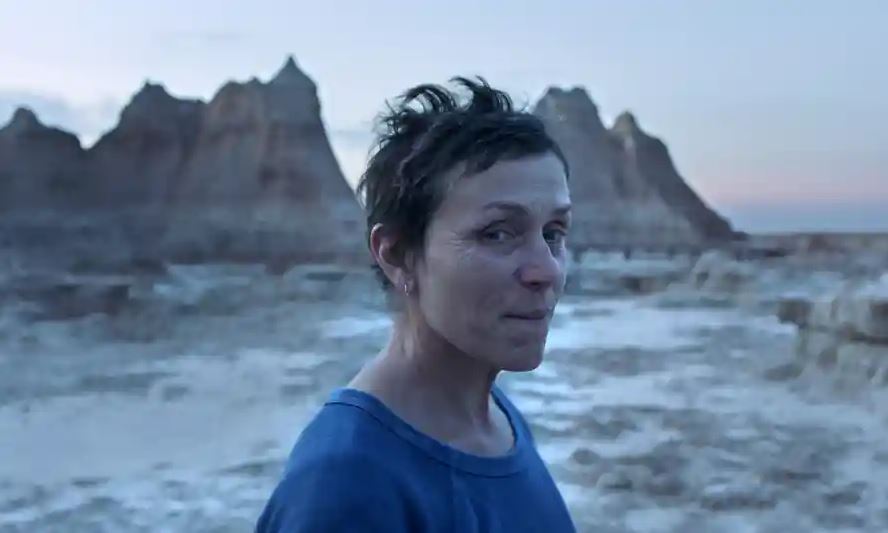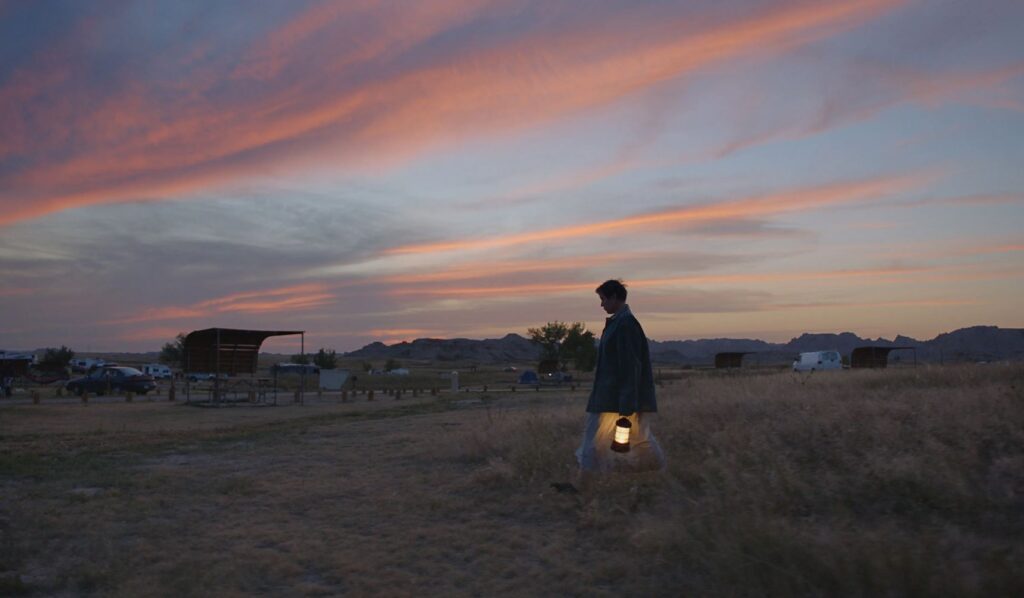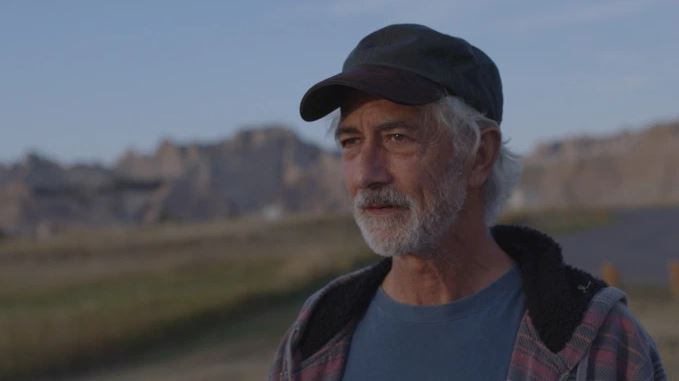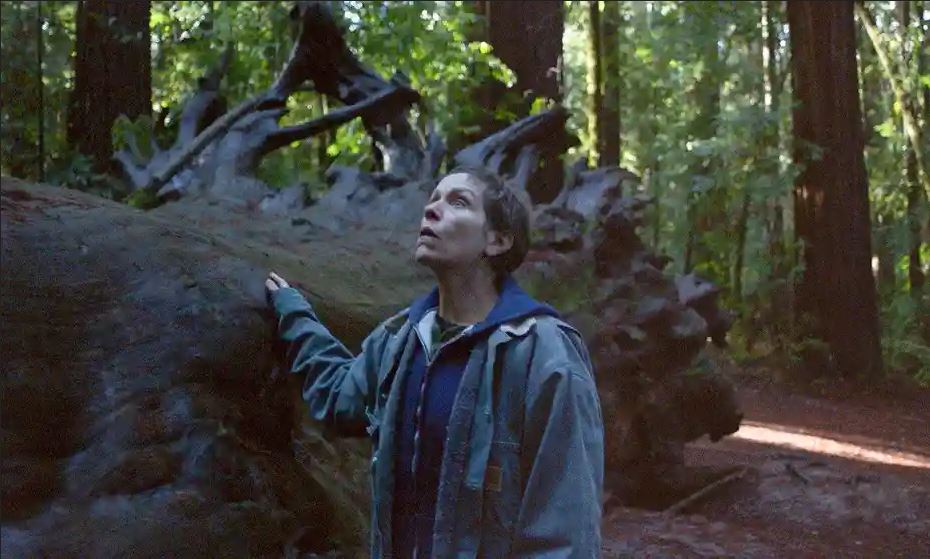
An ambitious cinematic tone poem that seeks to stand as tall as the stately redwoods it rapturously depicts, Chloé Zhao’s Nomadland pays homage to a number of distinctly American wonders: the crashing waves of the Pacific; the rocky palaces of the Badlands; Frances McDormand’s face. With soft-blue ice chips for eyes and hard lines creasing the corners of her mouth, the two-time Oscar winner has the chiseled look of an artifact excavated from one of the film’s historical preserves. But there’s nothing antiquated about McDormand’s performance, which is clipped and unsentimental, but also open and brimming with feeling. She’s the main attraction of this mostly lovely, occasionally frustrating movie, which doesn’t so much tell a story as communicate an experience.
That was more or less true of Zhao’s prior film, The Rider, which deployed non-professional actors to refract the gauzy mythology of the cowboy through the cold prism of modernity. I was somewhat immune to The Rider’s low-key charms; it often felt more like a vibe than a movie. Nomadland operates in a similar vein, but Zhao’s filmmaking has grown more expressive. Soundtracked by gentle compositions from the pianist Ludovico Einaudi, her camera greedily contemplates the vastness of the American frontier, discovering landscapes both beautiful and desolate. The country captured in this picture looks like a gorgeous place to visit and a hard place to live.
Resisting traditional conflict and catharsis at every turn, Nomadland doesn’t traverse an arc so much as travel along a series of lightly undulating waves. Appearing in every scene, McDormand plays Fern, a former Nevada plant worker who, when the film opens, has lost her job and her husband in quick succession. Describing herself as “houseless” rather than homeless, Fern now shuttles up and down the Western United States in her trusty white van (nicknamed Vanguard), accepting various part-time gigs: a holiday rush worker at Amazon, a kitchen staffer at a restaurant, a host at an RV campsite. She goes where the work is, a function of both basic survival and a restless need to stay on the move.

In terms of plot, that’s pretty much it. A vague specter of danger may loom over Fran’s itinerant adventures, but Zhao’s temperament is too empathetic for her to threaten her characters with any tangible peril. When the northern weather gets too cold, Fern drives south to Arizona; when her van breaks down, she catches a bus to Nebraska and visits her sister, who lends her some money. She hardly has it easy, but she never seems desperate. There is always a new gig to get, a new community to join, a new realm to explore.
Zhao’s spirit of warmth is admirable, but it’s still fair to criticize Nomadland as feeling a bit slack. It isn’t as though Fern needed to be terrorized by the wilderness or victimized by predators for her predicament to be compelling, but there’s a weird irony to the movie’s pacing; it’s about someone who’s constantly in motion, yet it exhibits utter indifference toward momentum. It ambles, a quality that can be sluggish as well as enveloping.
Still, in chronicling Fern’s interactions with others, Zhao’s central humanity shines through. Over 110 easygoing minutes, Fern meets a number of fellow nomads, all of whom share her appreciation of the open road but who clearly have their own story. As in The Rider, most of these compatriots are played by first-time actors, a choice that both burnishes the film’s authenticity and occasionally mires it in slight awkwardness. The happy exception to this rule is David Strathairn, who shows up early on at a lo-fi music festival and remains within Fern’s orbit for most of the movie. An uncommonly sensitive performer, Strathairn is perfectly in tune with Zhao’s meditative rhythms, and together he and McDormand create a relationship that’s profoundly touching in its unspoken desires and brittle asymmetry.

Fern, we eventually discover, is something of a contradiction: She closes herself off to true intimacy, but she also enjoys meeting new people and is sincere about helping others. Her ruthless self-sufficiency can feel both inspiring and tragic, and McDormand—through her still body language and rock-steady physicality—highlights the character’s bone-deep sadness without ever overplaying it.
And Nomadland itself is both rigorously narrow and surprisingly expansive, with a sweeping lyricism that belies its modest scope. (In this, it would pair well with both Andrea Arnold’s American Honey and Debra Granik’s Leave No Trace, though it arguably lacks the grandeur of the former and the poignancy of the latter.) Yet while Zhao envisions Fern as a woman in peaceful communion with the natural world, she’s doing more than just painting pretty pictures. In detailing her protagonist’s peripatetic exploits with such luminous care, she pays broader tribute to marginalized classes, focusing on earthy figures whose lives rarely enter into American cinema.

Which is less tacky—less “giving voice to the voiceless”—than it sounds. There is, without doubt, an undercurrent of discontent running through Nomadland, a simmering resentment toward the political and economic systems that conspired to put Fern out of house and job. Yet despite telling the story of a woman displaced by market forces, the film isn’t really polemical. (The closest it comes to engaging in dialectical argument occurs when Fern quietly lambasts her brother-in-law for playing the stock market with other people’s homes.) It would disserve Fern’s independence and resourcefulness to describe her as suffering a plight, just as it would diminish Zhao’s grace and whimsy to characterize her as helming a piece of agitprop.
Nomadland essentially ends as it begins, refusing to provide Fern with an epiphany or to incite any change in her circumstances. Does that mean she’s running in circles? I doubt she’d see it that way. And the wonder of this movie is that it provokes genuine concern for Fern’s condition without passing judgment on her decisions. You might say she’s lost. She’d likely counter that she’s free.
Grade: B+
Jeremy Beck is the editor-in-chief of MovieManifesto. He watches more movies and television than he probably should.
